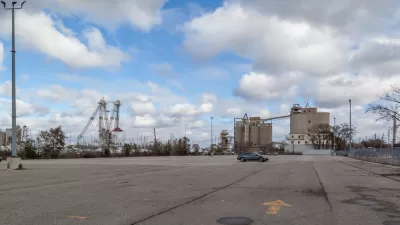Technology will be part of everyday life in a new Toronto neighborhood, planned by Sidewalk Labs. But looking to the future is also raising a host of privacy concerns.

Alphabet’s Sidewalk Labs is teaming up with Waterfront Toronto on Quayside, a 12-acre planned neighborhood on Toronto’s eastern waterfront. The technology-enhanced development has generated concerns about data collection, privacy, and security.
“Critics have sounded alarm bells that so-called urban data — information collected about people in areas such as lobbies, streets, plazas, parks and open spaces near Sidewalk Labs’ mostly residential development — should be in the hands of government, rather than a large, profit-driven U.S. company,” reports Donovan Vincent.
Other criticism has focused on the monetization of data as an outcome of this project. To address these concerns, Sidewalk Labs recently released a Digital Governance Proposals document. “In the draft report, Sidewalk says the monetization of data will not be part of its business model, adding it has committed not to sell personal information or use it for advertising,” says Vincent.
In addition, Sidewalk Labs says guidelines will be in place to protect individuals’ privacy and a data trust will manage collected data. “Sidewalk Labs said in order to protect privacy, any group or business entity proposing to collect or use urban data, including Sidewalk Labs itself, would first have to file a ‘responsible data impact assessment’ with the trust,” reports Vincent.
Still, say critics, the proposals are not adequate and Sidewalk Labs, as a vendor, should not be developing such guidelines. Sidewalk Labs will seek public input on the draft proposals as it moves forward with Waterfront Toronto to develop the Quayside master plan, due out early next year.
FULL STORY: Sidewalk Labs promises not to control data collected in Quayside’s public spaces

Planetizen Federal Action Tracker
A weekly monitor of how Trump’s orders and actions are impacting planners and planning in America.

Maui's Vacation Rental Debate Turns Ugly
Verbal attacks, misinformation campaigns and fistfights plague a high-stakes debate to convert thousands of vacation rentals into long-term housing.

San Francisco Suspends Traffic Calming Amidst Record Deaths
Citing “a challenging fiscal landscape,” the city will cease the program on the heels of 42 traffic deaths, including 24 pedestrians.

Amtrak Rolls Out New Orleans to Alabama “Mardi Gras” Train
The new service will operate morning and evening departures between Mobile and New Orleans.

The Subversive Car-Free Guide to Trump's Great American Road Trip
Car-free ways to access Chicagoland’s best tourist attractions.

San Antonio and Austin are Fusing Into one Massive Megaregion
The region spanning the two central Texas cities is growing fast, posing challenges for local infrastructure and water supplies.
Urban Design for Planners 1: Software Tools
This six-course series explores essential urban design concepts using open source software and equips planners with the tools they need to participate fully in the urban design process.
Planning for Universal Design
Learn the tools for implementing Universal Design in planning regulations.
Heyer Gruel & Associates PA
JM Goldson LLC
Custer County Colorado
City of Camden Redevelopment Agency
City of Astoria
Transportation Research & Education Center (TREC) at Portland State University
Jefferson Parish Government
Camden Redevelopment Agency
City of Claremont




























